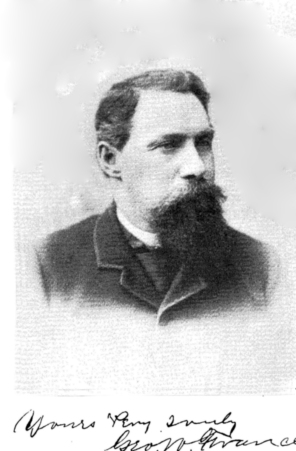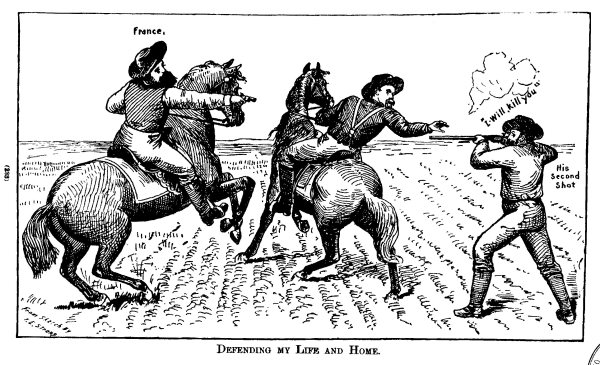 Mr. France, who lived from 1865 to 1889, left us a record of his life in his book, The Struggles for Life and Home in the North-West: By a Pioneer Homebuilder. Unfortunately, for him, he was compelled to spend numerous years of his life in “Hell on Earth” – the Seatco Prison. His misfortune was to some degree our good fortune because it gives us a detailed view of what life was like in that institution.
Mr. France, who lived from 1865 to 1889, left us a record of his life in his book, The Struggles for Life and Home in the North-West: By a Pioneer Homebuilder. Unfortunately, for him, he was compelled to spend numerous years of his life in “Hell on Earth” – the Seatco Prison. His misfortune was to some degree our good fortune because it gives us a detailed view of what life was like in that institution.
Mr. France was arrested for murder. He contended all his life that the arrest was part of a conspiracy by members of the secret Masonic society, which either included or controlled the government and judicial officials for their personal profit. If his version of the story is true he was undoubtedly convicted unjustly and incarcerated for years.
On Nov. 25th, 1889, Congressman Thomas H., Brents wrote, “To Whom It May Concern:–” a personal recommendation of Mr. France stating that he had been convicted of second degree murder but, “it is now generally believed that he committed the homicide in necessary self-defence and, is innocent of any crime whatever.”
An interesting aside here is that prison records list Mr. France as prisoner 53, convicted in Dayton, WA, and incarcerated in 1879 for the crime of Grand Larceny.
Born in New York, George left home during the last winter of the Civil War; 1984-65, and headed west. I assume that he was too young to have fought in that war; he makes no mention of any military service. He was bored, and wanted to, “…see and know more of the living, bustling, wild and wide world.” He clarified that it was, “…not exactly to hunt buffalo and kill Indians on the plains, for killing was never sport to me…”. His travels took him to the oil fields of Pennsylvania, across the country to Utah and California. He drilled for oil, drove wagons, hauled freight, cut timber, farmed, and worked in mines. In 1870 he arrived in the Washington Territory making his way through Lewiston, the Walla Walla area and finally to Dayton, where he spent some time working and building up a nest egg with which he bought a piece of property and built a cabin on it. He sold the improved land and with his savings was finally able to obtain land for himself and his new wife somewhere between the Pataha and Alowa creeks in what is now Garfield County.
It was this land, which France worked and built upon until 1879, that led to his incarceration at Seatco. He became the target of a claim jumper who he had allowed to build a cabin on a small part of his land. The guest soon began a campaign to wrest France’s land from him. In 1878 the situation escalated until the claim jumper came after France with a rifle, threatened to kill him and, in fact, shot at him. A gun battle ensued during which France managed to place four chunks of lead in his assailant. Wounds not withstanding, it took two men to wrestle the man’s rifle away from him, after which, “[Mr.] Jumper,” (not his name, merely referring to him as a claim jumper), “went to his house, boasted that ‘he had shot my companion as well as me,’ and in 12 hours died….”
In fact, although he had fired several shots, neither France or his friend were hit.
 Mr. France dedicates much of his book to his belief that the courts, the government, and the judicial system were controlled by the secret brotherhood of the Masons. Unfortunately for him, his claim jumping neighbor was either one of the brotherhood or was used as a convenient tool in a protracted attempt to gain possession of the land he had put so much sweat into.
Mr. France dedicates much of his book to his belief that the courts, the government, and the judicial system were controlled by the secret brotherhood of the Masons. Unfortunately for him, his claim jumping neighbor was either one of the brotherhood or was used as a convenient tool in a protracted attempt to gain possession of the land he had put so much sweat into.
Now, while this appears to be a clear-cut case of self-defence, Mr. France was subsequently arrested, witnesses for his defense intimidated and a conviction for murder rendered. Thus began his years in Seatco prison, during which he was often told that his case would be reviewed and that he would undoubtedly be found innocent, but it would help of he would just sign over his land to the right people.
According to Mr. France, his trial was a mockery, he was prevented from subpoenaing witnesses–two of which were thrown in jail and threatened until they refused to testify–was denied knowledge or review of the jurors and “defended” by lawyers aligned with the corrupt judicial system. Despite preparing his own motion for a new trial, his counsel advised the court that, “it would not be in their client’s interest to have a new trial.”
Convicted he was, and convicted he stayed, and the next years of his life were spent in Seatco Prison — Hell on Earth.

I used to live in Bucoda Wa. I would like to know where I can get these books
Julie,
As you can see, it’s been awhile since I’ve visited my own blog. The book by George France I found on Amazon. Anything else was at the library. Hope that helps, although belatedly.
Ray